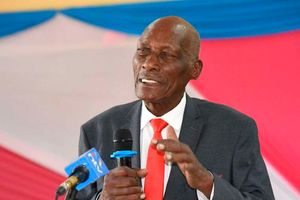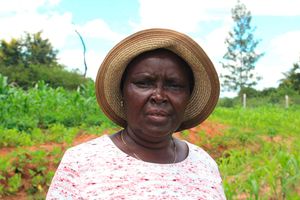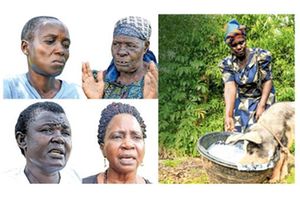
Court has advised three orphans excluded from their father’s inheritance to pursue available legal channels to contest a Will bequeathing all assets to their stepmother
A Family Court in Mombasa has advised three orphans excluded from their father’s inheritance to pursue available legal channels to contest a Will bequeathing all assets to their stepmother.
The case involves the family of the late business mogul David Patrick Mitchell whose wealth includes shares in more than five companies in Kenya and funds in Kenyan and foreign currencies.
Patrick died in Marbella Malaga Hospital in Spain on September 23, 2019, and his wealth bequeathed to his second wife, Simona Longoni, whom he married in the 1990s after dissolving his first marriage to Rosa Maria Mitchell in 1989.
Ms Erica Mitchell, Patrick's daughter from his first marriage, filed an objection challenging the validity of the Will her father purportedly wrote before his death.
Ms Erica, acting on behalf of her two siblings, Nicole Lovece and Gayle Mitchell, argued that their late father lacked the necessary mental capacity due to an illness at the time.
Justice John Onyiego noted that even though the wishes of a testator must be respected, Ms Erica Mitchell and her two siblings may apply for reasonable provision to benefit from the assets in Kenya without necessarily proving maintenance or dependency.
Written Will
“Should the objectors find it necessary, they will be at liberty to make an application for reasonable provision in which case the court will consider the same on merit,” said the judge.
The judge informed Ms Erica that he could not make a determination on the reasonable provision since it was not initially pleaded, as her focus was on the Will's invalidity.
Justice Onyiego made this statement on July 24 while dismissing Ms Erica’s objection to an application for a grant of probate concerning the written Will of the deceased's estate.
The application was filed by Tushar Ramniklal Thakershi Pujara, who informed the court that he was the appointed executor of the Will of Mr Patrick Mitchell.
The dispute arose after the deceased’s appointed executor of his Will petitioned the Mombasa court in 2020, seeking a grant of probate for the written Will concerning the deceased's estate.
This Will essentially exclude his three children from the first marriage from any inheritance regarding his Kenyan wealth.
“The deceased was under coercion and or undue influence, thus lacking the necessary free agency. We, as his daughters, were not provided for in the will,” Ms Erica told Justice Onyiego.
She sought a share of their father’s estate, which, according to the Will, was bequeathed to the surviving widow as the sole beneficiary.
“Despite my father’s death on September 23, 2019, Ms Longoni informed us of his demise on October 1, 2019, long after the body had been cremated,” she argued.
She further claimed that their stepmother had consistently excluded them from their father’s life and affairs, surrounding herself with her relatives who manipulated their father, thereby excluding them from inheritance.
Father’s wedding
“We were never invited to our father’s wedding with Ms Longoni, an indication that she did not want us to benefit anything from our father,” she said
Ms Longoni denied exerting undue influence on the deceased when executing the Will or isolating him from his children, reaffirming that her husband was not coerced into executing his Will.
“The deceased was fit and in his right frame of mind when executing the will before two competent witnesses. He remained alert throughout and never lost his mental or cognitive ability until he died,” she said.
Ms Longoni further explained that the deceased’s cremation was his wish and that Erica and her sibling were not in contact with their father before 2019.
“The deceased led a normal life, driving himself around until September 10, 2019. Other than Ms Erica, the deceased had not developed any relationship with his other daughters at all,” she said.
She said she supported Ms Erica on a gratuitous basis even after the demise of their father and that she (Erica) was not dependent on the deceased before his death.
Ms Erica contended that the payments made by the deceased for their maintenance and general upkeep during the divorce from their mother do not replace their right to inherit their father’s property.
Tushar, the deceased business partner for over 30 years, stated he was lucid and sound, with no indication that he was incapable of making his Will at the time the document was created.
Michael John, a resident of the United Kingdom and the deceased’s business partner, testified he was confused towards the end of his life and that he later learned he had cancer.
Dr Lourdes Peralta Camisuli told the court that he was Patrick’s family doctor and he attended to him when he was sick.
“In my opinion, the deceased was all through conscious and of sound mind. The deceased never underwent mental treatment,” he said.
However, Justice Onyiego said Ms Erica did not adduce any evidence to prove that his father suffered mental incapacity due to the sickness he was suffering from.
The judge noted at the time she was living in Britain while his father was in Spain.
“What made them conclude that the deceased was incapacitated? There was no medical evidence or otherwise to prove mental incapacity. I am satisfied that the deceased was mentally fit when executing the will,” said the judge.
The judge further said there was no coercion or undue influence proved and that what played out were differences between the objectors and their stepmother.
“Having found that the deceased executed a valid Will, I do not find merit in the objection and the cross-petition herein hence I do dismiss the same,” said the judge.
Justice Onyiego directed that a grant of probate be issued to the petitioner, who shall then apply for confirmation within 45 days.
Ms Erica and her siblings are at liberty to make an application for reasonable provision should they find it necessary.
The court will then consider their application on merit.









